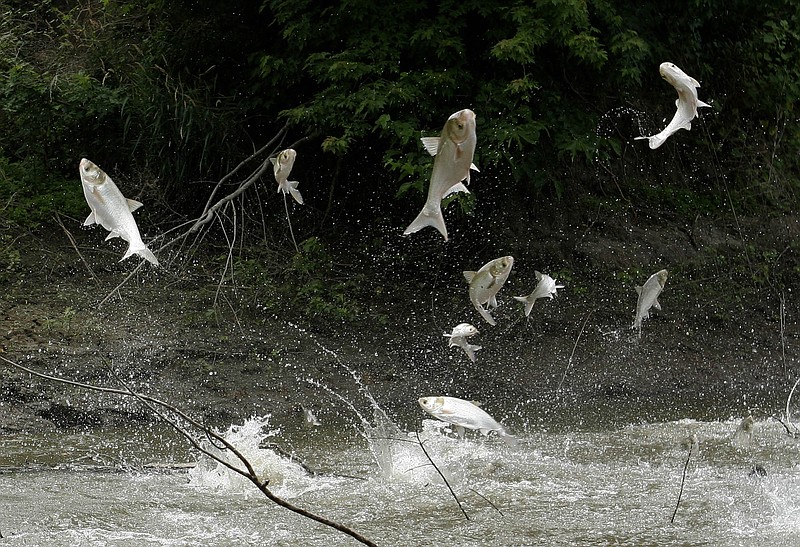Watch out for those flashy silver carp when you get around the Tennessee River.
They just might jump up and slap you. Seriously.
Especially if you startle them or go to singing the praises of Tennessee Gov. Bill Lee, who has it in for silver carp. He's unleashed the full posse of the Tennessee Wildlife Resources Agency after the Asian invaders after one was pictured recently by a fisherman trolling Chickamauga Lake.
"Asian carp negatively impact Tennessee's fisheries, recreational boaters, and local economies and we are committed to combating this problem," Lee said Monday in a statement after the photo of this glittery alien surfaced near Chattanooga, even as official also recently acknowledged that lake water samples found DNA indicating that a "few more" may be lurking in local waters.
Why all the fuss?
After all, Lee in December rightly announced that Tennessee will continue to welcome world refugees to our state in the coming year - even after President Trump in September gave states and local governments the right to refuse refugee resettlement within their borders. (The Trump administration has since backed away from the idea.)
So why would the governor harbor such fish refugee bigotry?
OK, we've had our fun, but there is a real concern. The silver carp and its other Asia cousins are an invasive species that can cause serious damage to the native fish populations - think bass, catfish, crappie and many more - because the carp out-compete our home-grown swimmers for food and space. Asian carp also are thought to lower water quality, which can kill off sensitive organisms like native freshwater mussels.
Carp is to our rivers as kudzu is to our forested ridges and backyards.
As a matter of fact, carp got here in the first place much the same way kudzu did. Both were imported by agricultural or fisheries agents to be a natural control for something else that at the time was thought to be a problem or pest.
The smaller and less offensive common carp native to Europe has been in America for more than 100 years, brought here by early settlers, according to the National Park Service and the U.S. Fish and Wildlife Service. But the newest carp invaders - bighead carp, black carp, grass carp, and silver carp (collectively known as "Asian carp") - were introduced here in the 1970s to control algae, weed, and parasite growth in aquatic farms, weeds in canal systems, and as one form of sewage treatment.
But the captive fish during floods escaped into the Mississippi River basin and established breeding populations. Now the Asian carp are now making their way up the Mississippi River and its tributaries - like the Ohio River into which the Tennessee empties.
And, yes, the silver ones can grow up to four feet long and weigh 75-100 pounds, so when a school of them is frightened and jumps eight to 10 feet out of the water, they can damage boats and injure boaters.
But that's not the biggest threat to anglers or to us, rather it is economic. The 2019 Bassmaster Classic created an economic impact of $32.2 million for Knoxville and East Tennessee, according to a report released by the Visit Knoxville Sports Commission, host of the 49th world championship. That was just one tournament at just one city on our 652-mile-long Tennessee River. Bass fishing is big business.
Dan Chapman, spokesman for the U.S. Fish and Wildlife Service, says the Tennessee River, and our sporting and boating way of life on it already is under siege in Alabama's and West Tennessee's lower reaches. There the silver carp already has a growing hold, and it is working its way upriver - as the photo from the Chickamauga Lake shows.
So Lee's commitment to combat the carp is important. Tennessee supported and assisted with an experimental sound barrier at Barkley Lock which started testing on Nov. 8, 2019. This barrier combines sound, light and bubbles to deter carp from entering Barkley Lock near where the Cumberland River joins the Ohio. TWRA also has been subsidizing commercial harvests on the Tennessee River's Kentucky Lake to reduce numbers of carp. As of 2018, more than 3 million pounds had been removed, and similar efforts in Kentucky removed even more carp. Now TWRA will increase surveillance of carp in Nickajack, Chickamauga, and Watts Bar lakes.
One reader of Tuesday's story about Lee's support was cynical. "Find a way to market the carp ... . Send the meat to China, the heads to Maine to trap lobster, and the guts to the cosmetic industry. Isn't it a boon to the sport fishermen? Doesn't our governor have better things to do, like fighting poverty?"
No, it isn't a boon to sport fishermen, but perhaps our story didn't make that clear enough. And, with all due respect, we think fighting a fish that threatens our native fisheries and ecology - our "underwater rainforest" as the Chattanooga centric region of rivers and streams has been dubbed - is preventively fighting poverty. Just ask Knoxville and the Bassmasters.
